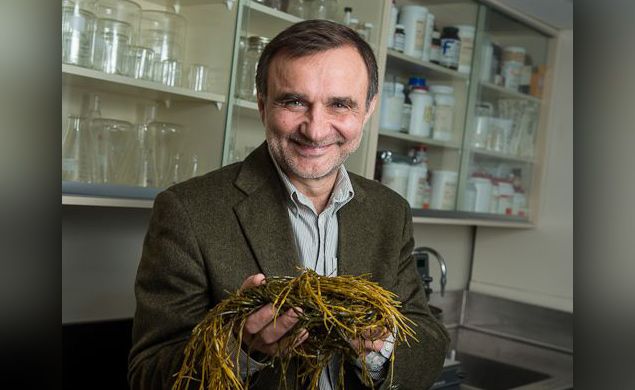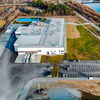Processing Your Payment
Please do not leave this page until complete. This can take a few moments.
- News
-
Editions
View Digital Editions
Biweekly Issues
- December 15, 2025
- December 1, 2025
- Nov. 17, 2025
- November 03, 2025
- October 20, 2025
- October 6, 2025
- + More
Special Editions
- Lists
- Viewpoints
-
Our Events
Event Info
Award Honorees
- Calendar
- Biz Marketplace
Latest court decision seen as setback for commercial harvesting of rockweed
 Courtesy / Acadian Seaplants
Jean-Paul Deveau, president of Acadian Seaplants, a Dartmouth, Nova Scotia, company that employs 50 rockweed harvesters and five full-time employees in Downeast Maine, is shown in this file photo. He called this week's court ruling "an extremely unfortunate decision for an entire industry and for Maine's economy."
Courtesy / Acadian Seaplants
Jean-Paul Deveau, president of Acadian Seaplants, a Dartmouth, Nova Scotia, company that employs 50 rockweed harvesters and five full-time employees in Downeast Maine, is shown in this file photo. He called this week's court ruling "an extremely unfortunate decision for an entire industry and for Maine's economy."
A court decision affirming that the so-called “intertidal zone” is part of privately held shorefront landownership, rather than public property, could hamper the commercial rockweed industry along Maine's coast.
The industry employs harvesters of the brown microalgae, abundant along Maine's coast, that's used for products like nutritional supplements for humans and pets, fertilizer, agricultural products, packing material for lobsters and as a stabilizer in food and cosmetics
The intertidal zone is land between the mean high-water mark and the mean low-water mark out to about 500 yards.
The Maine Supreme Judicial Court issued its decision on Kenneth W. Ross et al. v. Acadian Seaplants Ltd. on March 28. The case was an appeal of a 2017 ruling by Maine Superior Court Judge Harold Stewart II that rockweed in the intertidal zone belongs to the owner of the flats on which it grows.
“This is an extremely unfortunate decision for an entire industry and for Maine’s economy,” Jean-Paul Deveau, president of Dartmouth, Nova Scotia-based Acadian Seaplants, said in March 28 news release. “The sustainable harvesting of rockweed has created jobs and grown businesses, all of which are creating sustainable and environmentally friendly products.”
Despite the decision, Acadian Seaplants intends to maintain its operations in Maine, the release says. Moving forward, Acadian Seaplants will seek permission from landowners to harvest rockweed where required.
Deveau told Mainebiz he didn’t know the full ramifications of the decision yet.
“We’re working to find a path forward to continue to operate,” he said, adding that his company will confer with the Department of Marine Resources.
Until now, he said, the company has been allowed to operate as it had prior to the 2017 decision.
“From the day we started 15 years ago, we have been harvesting in the intertidal zone,” he said.
Many other species of seaweed grow outside the intertidal zone.
“But the one we’re talking about is Ascophyllum nodosum, which is the only one we harvest in Maine,” he said. “And that particular seaweed only grows in the intertidal zone.”
Most of Acadian Seaplant’s operations are in Washington County. It has grown operations over the past 20 years to include five full-time employees, upwards of 30 seasonal hand harvesters and two year-round mechanical harvesters, according to the release. In 2018, Acadian invested heavily in Maine, including $580,000 on operations; $400,000 on trucking and transportation and $100,000 in capital investments.
He added, “The real question is, what other activities that are currently taking place in Maine along the shoreline that could potentially be restricted?”
According to the release, Acadia has invested in Maine communities through ancillary relationships with companies like Whitney’s in Machias, which does Acadian’s engine repair; Look Lobster, which handles its trucking; and Billings Marine in Stonington.
In the past year, Acadian donated a total of $15,000 to Shead High School in Eastport, Machias High School, Jonesport-Beals High School for programs in which high school students conducted experiments with Acadian Seaplants’ products, testing rockweed-based biostimulants on mung beans.
The plaintiffs in the original case own land on Cobscook Bay.
Acadian Seaplants is the largest independent manufacturer of marine plant products of its type in the world. It harvests rockweed during mid-tide, using three- to four-ton capacity skiffs and specially designed cutting rakes, according to the decision. During the harvesting operation, Acadian operates the watercraft in intertidal waters without walking or traveling on the intertidal land itself. Acadian annually harvests the statutory maximum 17% of eligible harvestable rockweed biomass in Cobscook Bay
In a statement issued via Acadian Seaplants, Dave Preston, president of the Maine Seaweed Council, called the decision “disappointing and a setback to Maine's sustainable rockweed harvesting industry.”
The decision, he said, “will not deter us from ensuring this fishery functions responsibly and proactively.”
Mainebiz web partners

The Giving Guide
The Giving Guide helps nonprofits have the opportunity to showcase and differentiate their organizations so that businesses better understand how they can contribute to a nonprofit’s mission and work.
Learn More
Work for ME
Work for ME is a workforce development tool to help Maine’s employers target Maine’s emerging workforce. Work for ME highlights each industry, its impact on Maine’s economy, the jobs available to entry-level workers, the training and education needed to get a career started.
Learn More
Groundbreaking Maine
Whether you’re a developer, financer, architect, or industry enthusiast, Groundbreaking Maine is crafted to be your go-to source for valuable insights in Maine’s real estate and construction community.
Learn more-
The Giving Guide
The Giving Guide helps nonprofits have the opportunity to showcase and differentiate their organizations so that businesses better understand how they can contribute to a nonprofit’s mission and work.
-
Work for ME
Work for ME is a workforce development tool to help Maine’s employers target Maine’s emerging workforce. Work for ME highlights each industry, its impact on Maine’s economy, the jobs available to entry-level workers, the training and education needed to get a career started.
-
Groundbreaking Maine
Whether you’re a developer, financer, architect, or industry enthusiast, Groundbreaking Maine is crafted to be your go-to source for valuable insights in Maine’s real estate and construction community.
ABOUT
NEW ENGLAND BUSINESS MEDIA SITES
No articles left
Get access now
In order to use this feature, we need some information from you. You can also login or register for a free account.
By clicking submit you are agreeing to our cookie usage and Privacy Policy
Already have an account? Login
Already have an account? Login
Want to create an account? Register
Get access now
In order to use this feature, we need some information from you. You can also login or register for a free account.
By clicking submit you are agreeing to our cookie usage and Privacy Policy
Already have an account? Login
Already have an account? Login
Want to create an account? Register







0 Comments